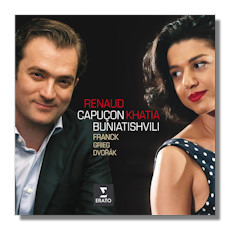
The Internet's Premier Classical Music Source
Related Links
-
Dvořák Reviews
Franck Reviews
Grieg Reviews - Latest Reviews
- More Reviews
-
By Composer
-
Collections
DVD & Blu-ray
Books
Concert Reviews
Articles/Interviews
Software
Audio
Search Amazon
Recommended Links
Site News
 CD Review
CD Review
Romantic Works for Violin & Piano

- César Franck: Sonata for Violin & Piano in A Major
- Edvard Grieg: Sonata for Violin & Piano #3 in C minor, Op. 45
- Antonín Dvořák: Four Romantic Pieces, Op. 75b
Renaud Capuçon, violin
Khatia Buniatishvili, piano
Erato 08256-462501 DDD 66:20
French violinist Renaud Capuçon and Georgian pianist Khatia Buniatishvili have been frequent partners in chamber music concerts. Their complementing temperaments – Gallic finesse and Georgian fire – have proven an exhilarating blend, while the charisma and winning stage presence of these brilliantly talented young artists evidently add to the fascination. In their debut disc as a duo for the resurrected Erato label they team up for an attractive program containing three romantic chamber music pieces of various origin, remarkably all written within the same time span 1886-1887.
The main course on this CD is César Franck's magnificent and multi-recorded Sonata which unfortunately turns out to be the least appealing in this offering. Part of the problem comes from the engineering. Capuçon's violin is balanced more forwardly and with Buniatishvili's piano always slightly in the back the essential fusion between the two instruments is hardly ever achieved. At worst it feels like the piano is merely accompanying the violin. As a performance, not everything comes together either. While there are passages of undeniable inspiration and Capuçon's rich and generous tone constantly commands admiration (as in the superb Recitativo Fantasia which appropriately sounds as improvised), overall this reading falls short of greatness by a lack of naturalness and simplicity. Tempo shifts after a very measured opening, forced contrasts in dynamics (as in the 2nd movement), can still pass for spontaneity or even sound exciting in the concert-hall, but they don't stand repeated listening. The differing climates that Franck offers in the last movement miss subtlety too. Buniatishvili's piano becomes in places too aggressive and blurred, and as in the opening Allegretto ben moderato there is a tendency to overcomplicate things.
Edvard Grieg's Third Sonata on the other hand is utterly convincing and demonstrates the magic of this partnership a whole lot better. Less cohesive then the Franck Sonata, with the focus often merely alternating between the two instruments, the issue of balance is less distracting here. It's magnificently played throughout and the fluctuating climate of energetic passion and melancholy suits the soloists like a glove. Capuçon's opening phrase is gripping yet the dramatic tension is sustained till the end. In the second movement with its contrasting themes both artists easily evoke tenderness and delicacy often lacking in their Franck Sonata. Capuçon's violin sings in every bar, while the central dance-like theme is performed with plenty of spirit.
Antonín Dvořák's Four Romantic Pieces are transcriptions from his Miniatures for two violins and alto. Here too, Capuçon and Buniatshvili effortlessly capture the vivacity and lyrical quality of these minute gems. If only the Franck Sonata was that good.
Copyright © 2014, Marc Haegeman




















